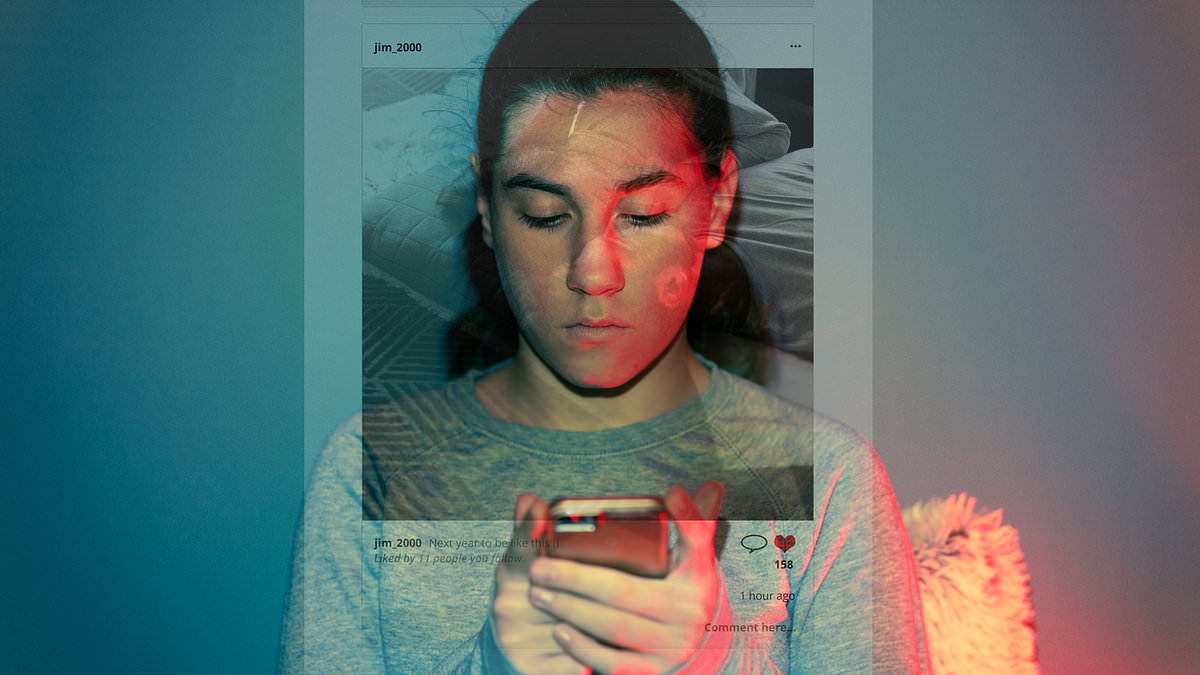Mental illness isn’t caused by transmissible viruses like the flu – but one new study suggests it might be spreading amongst teenagers nonetheless.
People who shared a ninth-grade classroom with someone diagnosed with a mental condition were nine percent more likely to develop the same condition at some point in the future, the study from University of Helsinki psychologists found.
Further, if someone had multiple classmates with a mental condition – they were 18 percent more likely to develop a condition of their own than those without mentally ill classmates.
But many other experts say that mental illness isn’t contagious, instead they blame the increase on things like the prevalence of social media and an increased focus on academic achievement.
‘These increases are significant especially because there is a notable service gap worldwide for mental health care,’ Dr Tracy Vaillancourt, a psychology professor at the University of Ottawa who wasn’t involved with the research, told DailyMail.com.

A new study from the University of Helsinki found people who had one classmate with a mental disorder were nine percent more likely to develop one themselves.
The researchers caution that their findings merely show there might be a link between these variables – and it doesn’t prove mental illness can spread amongst teens.
The study is just the latest a controversial topic of psychology, known as social contagion.
Social contagion is the idea that people are more likely to develop medical conditions – either they see their friends dealing with – a concept particularly potent among teenagers.
In a country where depression rates amongst adolescents are skyrocketing – some point to this phenomenon as the cause.
The Pew Research Center estimated there was a 59 percent increase in the number of teens who experienced depression from 2007 to 2017.
Roughly 5million teenagers had a depressive episode in 2021, representing about 20 percent of all 12-to-17 year old in the country, the NIH reported. Approximately one in nine kids have been diagnosed with ADHD, according to a recent CDC report.
The psychological theory was thrust into the spotlight in 2021, when girls across the world claimed they were developing symptoms of Tourette’s syndrome after watching TikTok creators who have the neurological condition that causes people to make involuntary movements or sounds.
Many were quick to blame social contagion.
Anti-trans activists also often leverage this idea to invalidate young trans adults.
But this has been robustly debunked by multiple papers – the most recent of which was published by Stanford psychiatrists in 2023.
Social contagion studies are often flawed, Dr Ezra Golberstein a professor of health policy at the University of Minnesota, wrote in a review of the topic while at the University of Michigan.
This is because the studies usually can’t rule out the affect that a teen’s environment and decision-making plays in their mental health.
For example, someone with depression might be more likely to befriend someone with depression simply because they have similar tendencies. In that case, it might seem like the pair influenced each other, when they were both going to develop the condition regardless of the scenario they were put in.
‘People choose where they live and work, and with whom they interact, and they may share characteristics with others in their social network that lead to similar outcomes,’ Dr Golberstein wrote.
Considering these shortcomings while reviewing previous studies, Dr Golberstein and colleagues concluded there was evidence that mental health could be ‘moderately contagious.’
But it’s likely less common and less influential than people think, he wrote.
This new study, lead by scientists at the University of Helsinki, attempted to address some of these shortcomings.
Instead of studying friend groups, they looked at the effect that classmates – whom young people are randomly assigned to spend a lot of time with – on each others’ mental health.
The study, which was published in the journal JAMA Psychiatry, looked at 713,800 Finnish people who were born between 1985 and 1987.
Even after accounting for factors like income, parental mental health conditions and location, the researchers found a correlation that could suggest mental illness could spread amongst peers.
This was particularly applicable for conditions like anxiety and depression – but wasn’t as clear for other mental disorders like schizophrenia.
Co-rumination is a psychological term that describes the common practice of rehashing and complaining about your problems over and over again.
Multiple studies have shown that even when controlling for other factors – people who co-ruminate with their friends are more likely to feel more depressed. This, studies have concluded, can spread.
Co-ruminating, ‘may serve as one mechanism in the dramatic rise in depression observed during adolescence, particularly among adolescent girls,’ Dr Lindsay B Stone, a psychologist from Georgia Southern University, wrote in one study about the phenomenon.
Another reason teens could be vulnerable to contagion is because an increased amount of education about mental illness could encourage impressionable kids to see everyday stressors through a medical lens, the authors wrote.
Dr Vaillancourt said the study was, ‘well done,’ and supports the idea that she, and many have long held, that social spreading could be contributing to the rise of teenagers with mental issues.
Psychologists who treat conditions that have long been seen as potentially ‘contagious’, like eating disorders, take this concept into account when treating teenagers, Dr Vaillancourt said.
However, it may be important for physicians treating minors for other conditions to consider as well, she told this website: ‘It will be important to carefully examine how the increased awareness of mental health influences the scope and presentation of mental disorders.’
One of the ways to combat this problem is to make sure that mental health awareness campaigns are clear about what is a medical condition and what is a normal reaction to stress, study author Christian Hakulinen, a psychologist at the University of Helsinki, told New Scientist.
‘We have to be careful that we don’t overtreat and think that normal reactions are somehow abnormal behaviour,’ he said.










